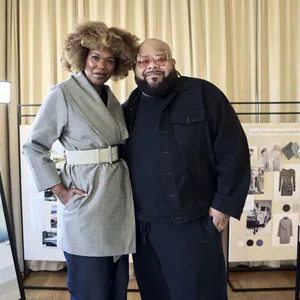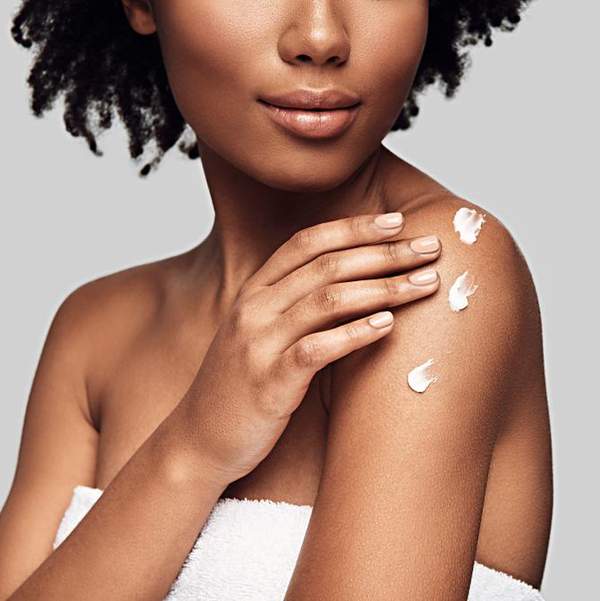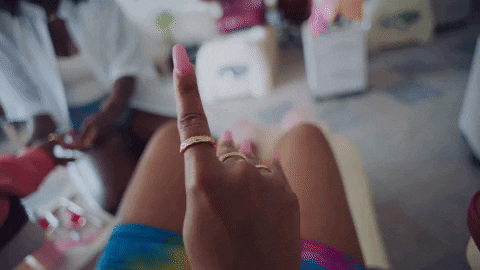I promise you that I love Black men; especially the kind of Black men like the one I recently held an impromptu conversation with. Here's the setup—while I was out supporting some local musicians at an event (if you're ever rolling through Nashville on a Sunday, check out Jason Eskridge's IG page to see if Sunday Night Soul is going on), I ended up catching up with a pretty well-known local celebrity musician in the city. Brandon Newsome is his name.
Anyway, as he was telling me about his deep love—and lust, in the most complimentary way possible—for Black women, this man who's in his mid-30s said something that made me high-five him as well as pat him on the back—"You know what I really love? Stretch marks and cute little dimples on the thighs. That's some grown woman-ish right there!" Beautiful.
So, before I even get into how to remove cellulite and stretch marks (among other things), it really should go on record that if you have either, to many grown folks, cellulite and stretch marks are not as unsightly as you might think. Even in a world of photoshopping and IG filters, and—as an ex of mine used to put it—wake-up-face-woman is still revered and in high demand.
But if you want to nix those skin "imperfections" simply because you want to feel more comfortable, I get it. Personally, nothing gets on my nerves more than the pimples that like to creep up on my shoulder blades just in time for June. Anyway, just so you can feel like your best self in your sexy swimsuit and beautiful sundresses, here are some natural ways to remove (or at least soften the appearance of) cellulite, body acne, stretch marks, and skin discoloration—oh, and I threw in a couple of natural ways to remove body hair too!
1.Get a Dry Brush
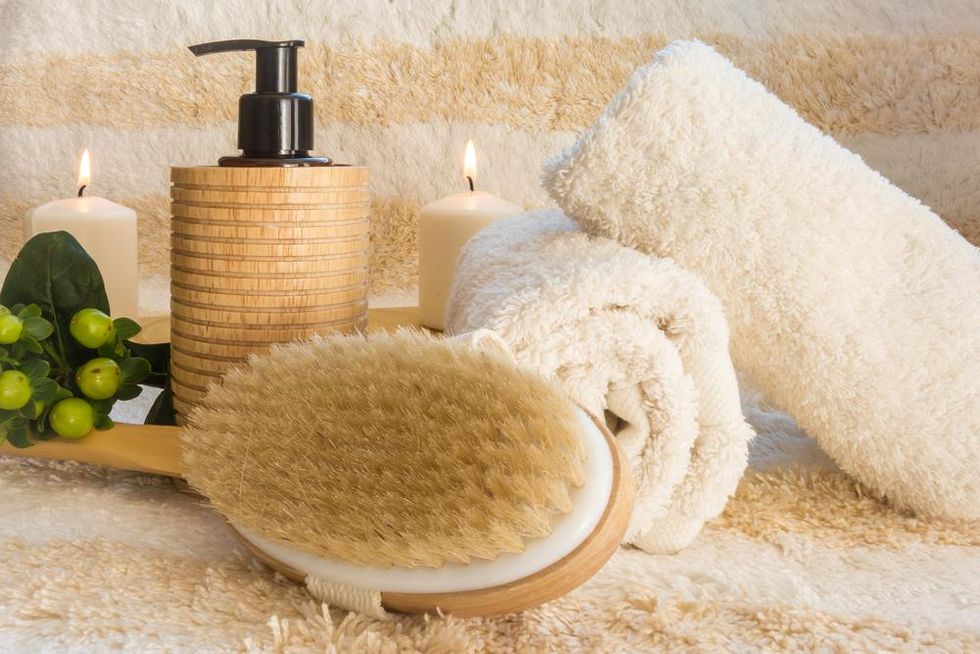
Shutterstock
Here's something that will make you want to change your sheets once a week. Did you know that every 60 seconds, we shed around 30,000 dead skin cells? Not every day, every single second! Some of them fall off while "thanks" to the sebum and dirt that's on our body, others stick. What helps to remove them is dry brushing before taking a shower. Another benefit that comes from dry brushing is it gets your blood and lymphatic system flowing, which ultimately removes toxins, tightens your skin, and softens the appearance of cellulite (the totally annoying subcutaneous fat that causes dimpling of the skin).
In order to get the best results, just make sure you use a natural bristle brush; one that is semi-firm. Also, be sure to brush in small circular motions, up towards your heart. It's most effective if you do this 20 minutes at a time, on a weekly basis.
2.Eat Gelatin
Don't get too excited. When I say "gelatin", I'm not talking about Jell-O. I'm referring to something along the lines of beef gelatin; it's a dietary supplement that contains amino acids glycine and proline that is good for your hair, skin and nails. Plus, it contains 20 grams of collagen per serving and is an awesome source of protein.
According to research on cellulite and what causes it, a lot of us end up with more than we should have on our bodies because we fail to get enough gelatin into our systems. After all, it's a part of what helps to build connective tissue, so without it…there's a little more wiggle and jiggle.
By the way, if you'd prefer not to eat it, there are supplements that you can take too.
3.Take Some Zinc
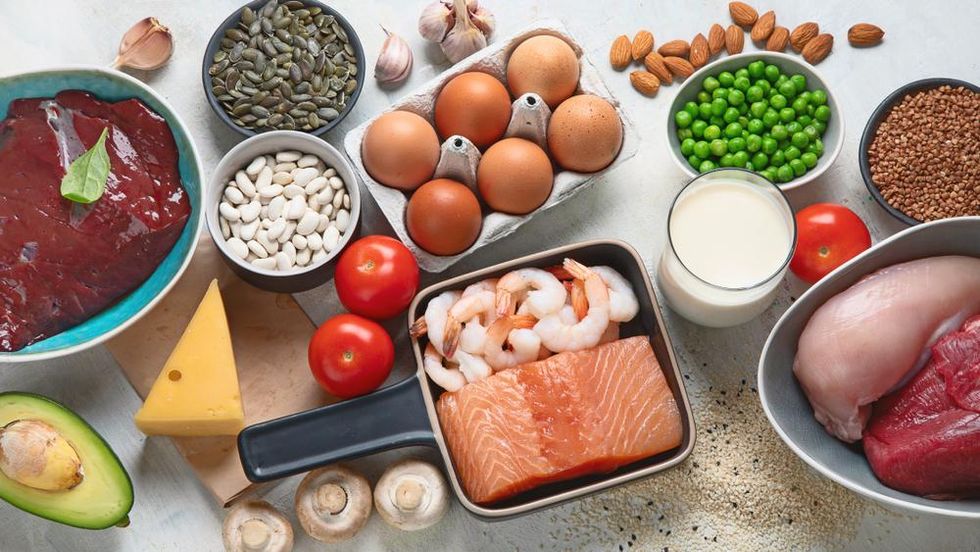
Shutterstock
Again, as someone who battles with shoulder and back acne right before my period and during the summertime, I can personally vouch for what zinc can do for breakouts. In fact, the reason why a lot of us end up with pimples (especially as adults) is because we don't have enough zinc in our system.
So, what exactly does zinc do? What doesn't it do? Zinc increases metabolism, renews cells, balances hormones, supports liver health and aids in nutrition absorption—all of which work to prevent zits from popping up.
As far as how much zinc you should take, nine milligrams a day is good. However, because zinc doesn't absorb well into the skin (neither does collagen; Google that sometime), it's best to avoid the creams and take a zinc supplement and/or eat foods that are high in zinc like eggs, nuts, whole grains, pumpkin and squash seeds and green beans and kale.
4.Apply a DIY Green Tea Toner
Green tea is loaded with antioxidants; that's part of the reason why it's so good for your immune system. The reason why it tops the list for fighting body acne is because it also contains flavonoids, tannins and EGCG (epigallocatechin-3-gallate) that work together to slow down sebum production, reduce inflammation and fight bacteria too. Research also reveals that green tea has the ability to hinder the growth of P. acnes, something that is a major factor in acne-prone skin.
A great way to get green tea into the body is to drink it (hot or cold). One way to get it onto your skin is to apply it as a toner. Just boil a couple of tea bags, let it steep and cool and then either put the cooled tea into a spray bottle or apply it onto your freshly washed skin with cotton balls. Try and do it daily for optimal results.
5.Exfoliate with Baking Soda
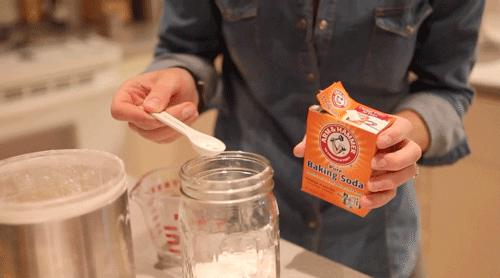
Unfortunately, what oftentimes follows a pimple is a scar. If you pick at it, it can take just that much longer for the scar to go away. If you're trying to get a few to fade so that you can avoid wearing quite as much concealer and foundation this summer season, try exfoliating your acne scar tissue with some baking soda. The tiny sodium bicarbonate crystals that's in baking soda will slough off dead skin cells and soften damaged tissue so that new skin will appear quicker.
All you need to do is make a paste out of baking soda and water. Wash the areas where the scars are, tone them and then apply the paste. Let it sit for 5-7 minutes and then rinse with cool water. Not only will the baking soda cleanse your pores and help to prevent future breakouts, but if you do this 1-3 times a week, you should see your acne scars start to fade away within a few weeks as well.
6.Do a Rose Hip Oil Rub
The vitamins and fatty acids in rosehip oil make it a great beauty regimen addition for hair, skin and nails. Not only does it help to treat extremely dry skin, but it also helps to significantly reduce aging signs, grow nails, soothe your scalp, protect your skin from environmental damage. Plus, thanks to its powerful astringent properties and trans-retinoic acid (an acid that regenerates skin cells), rosehip oil can also soothe acne wounds and heal acne scars over time too.
Wanna know what else rosehip oil does? Due to all of the essential fatty acids that are in it, rosehip oil can soften and prevent stretch marks by increasing the strength and elasticity of your skin.
7.Take Some Vitamin K
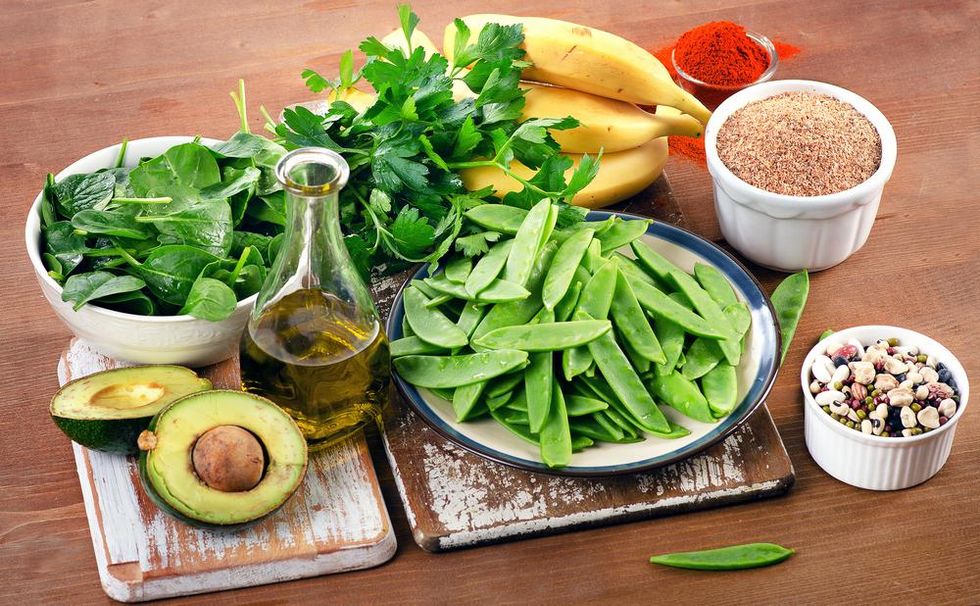
Shutterstock
Speaking of stretch marks, pretty much all of us have a set lurking around somewhere, but do you know what causes them? We all have three layers of skin—epidermis, dermis and base. Stretch marks occur when the middle layer tears; usually because our skin is stretching faster or wider than its elasticity's capacity due to things like pregnancy or extreme weight loss or weight gain.
Although you can't always totally get rid of stretch marks, you can reduce their appearance. One way to do that is by getting more Vitamin K into your system. It works because it helps to add more elasticity to your blood vessels. Foods high in Vitamin K include dark green veggies, chicken, prunes, kiwi, egg yolks, cheddar and butter.
8.Give Yourself an Alfalfa and/or Olive Oil Massage
Speaking of Vitamin K, something else that contains a concentrated amount of it is alfalfa. Alfalfa also has a ton of Vitamin E and essential amino acids in it too. As a bonus, alfalfa contains protein and antifungal properties that will detoxify your skin too. This is why it's something else that's a wonderful remedy for stretch marks.
A great recipe to try is to mix a tablespoon of alfalfa powder with a tablespoon of olive oil (it has vitamins A, D and E in it). Wash your skin, apply the paste onto it and gently massage the areas where the paste is. Let it sit for 10 minutes and then rinse. If you do this three times a week, you should see a noticeable difference in 4-6 weeks.
9.Make a Turmeric Mask

If you're nervous about putting on a new swimsuit due to some skin discoloration that you might have, my first recommendation is to get to the source of what caused it. If it's due to a birthmark or vitiligo, never forget that so-called flaws can be some of the most distinctive and beautiful things about us. On the other hand, if you've got discoloration because of contact dermatitis, eczema, psoriasis, tinea versicolor (I've actually had it before; it takes forever to clear up) or even candida, see a doctor. Treating these skin ailments may be all that you need to even out your skin tone.
But if your skin is discolored due to mild hyperpigmentation or aging, there are a couple of natural things that you can try. For starters, how about a turmeric mask? The properties in this particular mask is able to reduce inflammation, lighten dark circles, protect your skin from sun damage (because contrary to popular assumption, we need to use sunscreen too), lighten the appearance of stretch marks and, yes even out (mild) skin discoloration overall.
All you need to do is apply a turmeric mask to the areas where you want to even your skin out. Mix a tablespoon of turmeric powder, a teaspoon of honey, a half teaspoon of sweet almond oil and a few squeezes of fresh lemon juice (lemon contains antioxidants that lighten and brighten skin). Apply the mask to freshly washed skin, let it sit for 15 minutes, and then rinse thoroughly. It's best to do this twice a month for optimal results.
10. Apply Some Kiwi Extract
Something else that's awesome is kiwi extract. The high amount of Vitamin E that's in it helps to heal acne scars, reduce age spots and protect your skin from free radicals. Kiwi extract also contains the enzyme actinidin, which is great at exfoliating dead skin cells (something that can make your skin appear dry and dull).
One way to get to most out of what kiwi has to offer is to make your own kiwi sugar scrub. Combine two cups of white granulated sugar with three kiwis and one-half up of grapeseed oil. Mix everything together and gently massage your damp skin with it. Then wash as usual. Another approach is to take kiwi extract in supplement form. Just a heads up—supplements ain't cheap, so you might just wanna go the produce route instead.
11.Use a Pumice Stone
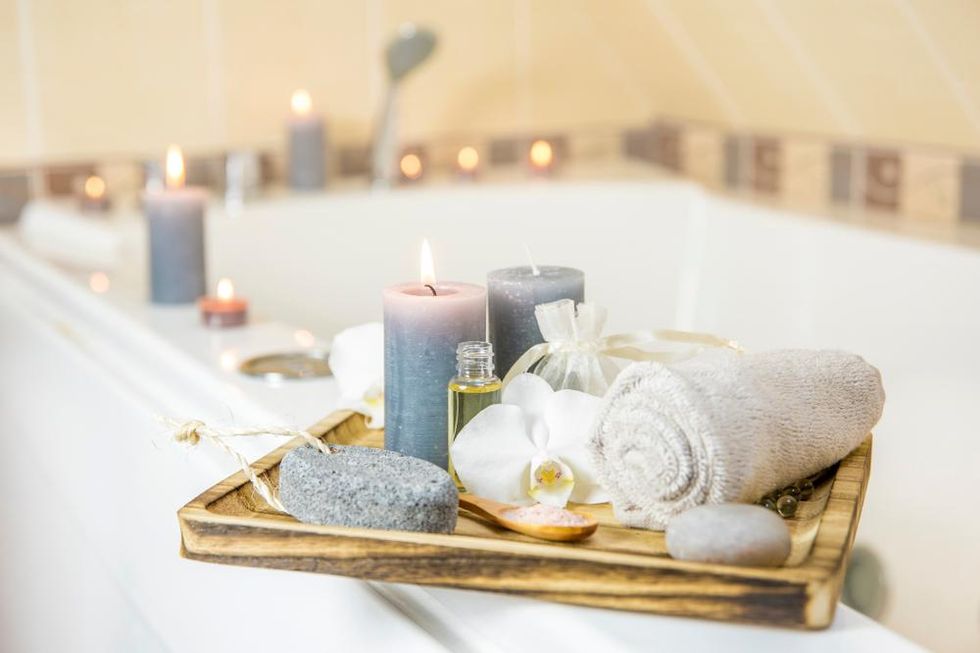
Shutterstock
Once your skin is fresh, radiant and summer-ready, the only thing left to do is to remove any unwanted hairs. If you're known to nick yourself shaving and/or you hate waxing, why not try a pumice stone? I know, you probably thought they were only for your feet; however, there are lots of women who say the stone is also really good at getting rid of fine hairs too.
All you need to do is rub the stone on your clean dry skin in small circular motions. The pores in the stone will cling to your hairs and pull them out. Just make sure to thoroughly moisturize afterwards and to avoid using the stone on your face, underarms or bikini line. It's a bit too harsh for sensitive areas.
12. Try a Papaya
One more tip—a papaya. Although this fruit won't remove hair, what it does do is weaken hair follicles over time so that you won't have to worry about hair coming back. Mash a teaspoon of fresh papaya with a teaspoon of turmeric powder. Lay out a towel that you don't mind getting dirty (turmeric has a tendency to stain) and apply the paste liberally to the areas where you want to get rid of unwanted hair for good. Let the paste sit for 15 minutes and thoroughly rinse off with warm water. If you do this once a week, you should see a reduction in hair growth in about a month. Pretty cool, huh?
Want more stories like this? Sign up for our weekly newsletter here and check out the related reads below:
8 Current All-Natural Beauty Trends You Can Give The DIY
Love On Yourself With These 7 All-Natural DIY Vaginal Washes
6 Sexy Bedroom Recipes That Will Spice Up Your Sex Life
12 DIY Beauty Hacks For Boss Girls On A Budget
Featured image by Shutterstock
- Caring for Your Skin during and after Cancer Treatment | Memorial ... ›
- That Booty Tho - The Original Stretch Mark and Cellulite Booty Scrub ... ›
- How To Get Rid Of Cellulitis Fast – Treatment For Cellulitis | skin ... ›
- Stay Up-To-Date With The Venus Blog | Venus Treatments ›
- How to Brighten Skin, Reduce Acne Scars, Discoloration, Uneven ... ›
- Witch Hazel: How to Use It to Clear Up Your Skin Fast - Dr. Axe ›
- How to Brighten Skin, Reduce Acne Scars, Discoloration, Uneven ... ›


